人教版_初中英语九年级教案_之_Unit_6_+_定语从句
初中英语《定语从句》名师优质课教案教学设计
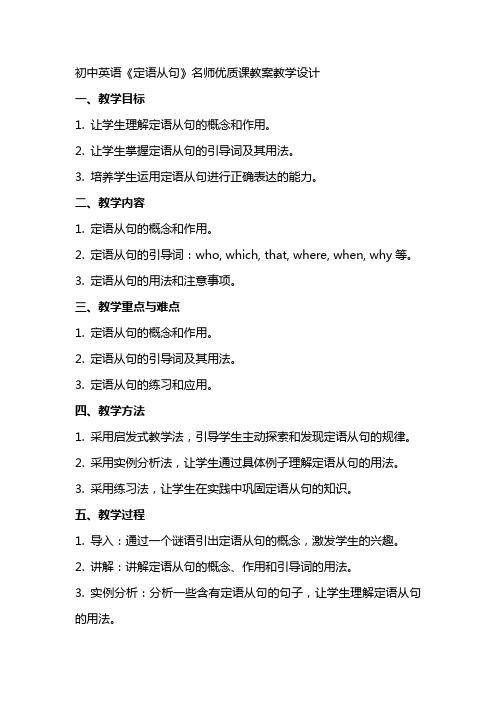
初中英语《定语从句》名师优质课教案教学设计一、教学目标1. 让学生理解定语从句的概念和作用。
2. 让学生掌握定语从句的引导词及其用法。
3. 培养学生运用定语从句进行正确表达的能力。
二、教学内容1. 定语从句的概念和作用。
2. 定语从句的引导词:who, which, that, where, when, why等。
3. 定语从句的用法和注意事项。
三、教学重点与难点1. 定语从句的概念和作用。
2. 定语从句的引导词及其用法。
3. 定语从句的练习和应用。
四、教学方法1. 采用启发式教学法,引导学生主动探索和发现定语从句的规律。
2. 采用实例分析法,让学生通过具体例子理解定语从句的用法。
3. 采用练习法,让学生在实践中巩固定语从句的知识。
五、教学过程1. 导入:通过一个谜语引出定语从句的概念,激发学生的兴趣。
2. 讲解:讲解定语从句的概念、作用和引导词的用法。
3. 实例分析:分析一些含有定语从句的句子,让学生理解定语从句的用法。
4. 练习:设计一些练习题,让学生运用定语从句进行表达。
5. 总结:对本节课的内容进行总结,强调定语从句的重要性和注意事项。
6. 布置作业:布置一些相关的练习题,让学生课后巩固所学知识。
六、教学策略1. 采用互动式教学,鼓励学生积极参与课堂讨论和练习。
2. 使用多媒体辅助教学,通过图片、视频等直观手段帮助学生理解定语从句。
3. 设计多样化的教学活动,包括小组讨论、角色扮演等,以适应不同学生的学习风格。
七、课堂活动设计1. 互动游戏:设计一个定语从句的连连看游戏,让学生在游戏中学习和巩固引导词。
2. 小组讨论:让学生分组,讨论定语从句在实际语境中的应用,分享学习心得。
3. 角色扮演:学生分组进行角色扮演,用定语从句描述人物特征,增强实际应用能力。
八、评价方式1. 课堂参与度:观察学生在课堂上的发言和互动情况,评价其参与度。
2. 练习完成情况:检查学生作业和练习册的完成情况,评估其对知识的掌握程度。
7九年级英语上册第6单元《课程纲要》
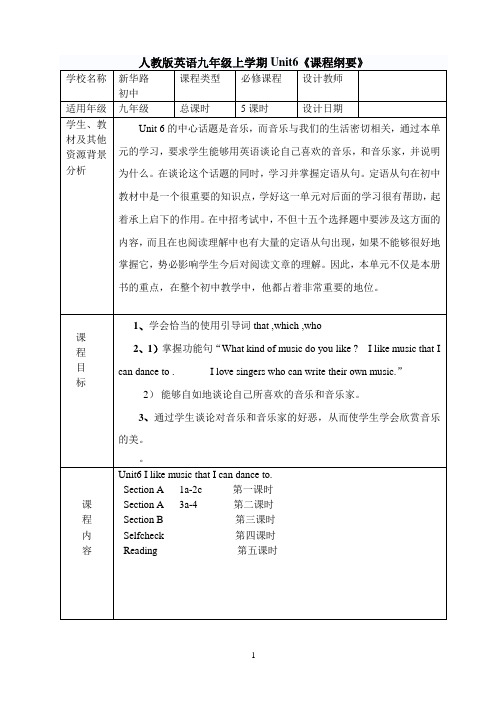
程目Biblioteka 标1、学会恰当的使用引导词that ,which ,who
2、1)掌握功能句“What kind of music do you like ? I like music that I can dance to . I love singers who can write their own music.”
2)能够自如地谈论自己所喜欢的音乐和音乐家。
3、通过学生谈论对音乐和音乐家的好恶,从而使学生学会欣赏音乐的美。
。
课
程
内
容
Unit6 I like music that I can dance to.
Section A 1a-2c第一课时
Section A 3a-4第二课时
Section B第三课时
Selfcheck第四课时
Reading第五课时
课
程
实
施
教法学法
1、教法:采取“任务型”教学法。教师根据本节课内容,安排合适的任务,让学生在完成任务的过程中达到本节课所拟定的目标。
2、学法:任务型。让学生通过完成课前找资料、上课积极参与、讨论,课后进行巩固和迁移等任务,来达到拟定的目标。
采用任务型教学法的根据:
初中英语新课程理念中说,使用“任务型”的教学,能让学习者在实施任务的过程中有更多的机会去接触可理解的语言输入,有更多的机会以口头或笔头的形式去进行语言交际,由此产生更多的语言互动或磋商性的活动,最终将促进他们更好更快地学习语言。四、教学环节的设计。
有
效
性
评
价
学生英语学习过程的评价
⒈利用课堂学生自评、互评、和教师评价,及时反馈学习信息。
⒉利用信息交流平台针对学生的学习情况、特性与家长定期进行交流。
人教版九年级英语Unit 6 I like music that I can dance to. Section A ( 1a-1c).说课稿
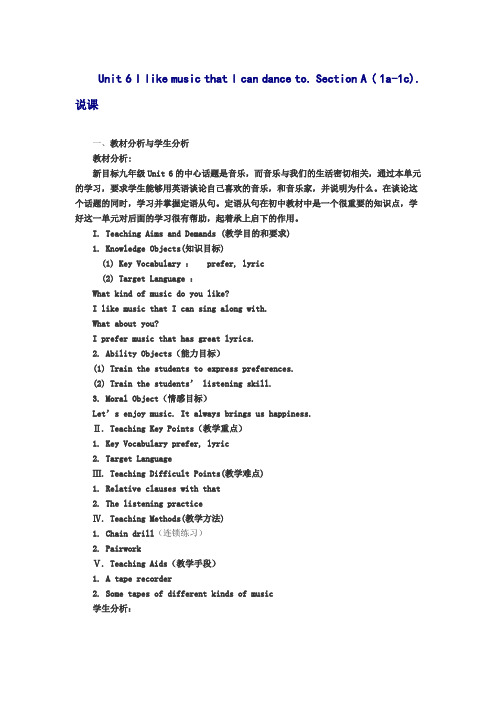
Unit 6 I like music that I can dance to. Section A ( 1a-1c).说课一、教材分析与学生分析教材分析:新目标九年级Unit 6的中心话题是音乐,而音乐与我们的生活密切相关,通过本单元的学习,要求学生能够用英语谈论自己喜欢的音乐,和音乐家,并说明为什么。
在谈论这个话题的同时,学习并掌握定语从句。
定语从句在初中教材中是一个很重要的知识点,学好这一单元对后面的学习很有帮助,起着承上启下的作用。
I. Teaching Aims and Demands (教学目的和要求)1. Knowledge Objects(知识目标)(1) Key Vocabulary :prefer, lyric(2) Target Language :What kind of music do you like?I like music that I can sing along with.What about you?I prefer music that has great lyrics.2. Ability Objects(能力目标)(1) Train the students to express preferences.(2) Train the students’ listening skill.3. Moral Object(情感目标)Let’s enjoy music. It always brings us happiness.Ⅱ. Teaching Key Points(教学重点)1. Key Vocabulary prefer, lyric2. Target LanguageⅢ. Teaching Difficult P oints(教学难点)1. Relative clauses with that2. The listening practiceⅣ. Teaching Methods(教学方法)1. Chain drill(连锁练习)2. PairworkⅤ. Teaching Aids(教学手段)1. A tape recorder2. Some tapes of different kinds of music学生分析:通过两年多的初中英语学习,这个学期的九年级学生已经掌握了一定的英语基础知识,他们也能够比较自觉地学习英语,并能够通过使用英语来表达他们的某些感受。
人教版_新目标英语_九年级_unit6_知识点总结

九年级英语Unit6【单元目标】Ⅰ.单词与短语单词prefer gentle remind heart latest feature display interest whatever miss suggest energy honest course suit expect taste actually mainly laboratory type cancer increase risk main shock短语1.prefer… to…比起…更喜欢…2.to be honest 老实说;说实在的3.remind of 提醒;使记起4.on display 展览;陈列5.be bad for 对…有害;有害于6.stay away from 与…保持距离7.be in agreement 意见一致8.dance to 随着…跳舞9.sing along with 伴随…唱歌10.be important to sb. 对某人重要11.be sure 确定;一定12.get together 聚集在一起13.cause cancer 致癌14.taste good 尝起来好Ⅱ.目标句型:---What / which kind of + n. + do / does sb like?---Sb like(s) / love(s) / prefer(s) / enjoy(s) +n. + that从句(表示一种限制)Ⅲ.语法定语从句(见最后一页)【重点词汇】1. prefer动词更喜欢宁愿a)prefer sth.更喜欢某事I prefer English. 我更喜欢英语。
b)prefer doing宁愿做某事To do 强调特定的或某次具体的动作He preferred reading at home on rainy days.c)即对某种行为的“偏爱”The boy preferred not to god)We prefer you to stay for dinnere)I prefer dogs to cats. 与猫相比我更喜欢狗。
九年级英语-Unit_6__I_like_music_that_I_can_dance_toAlnnUK
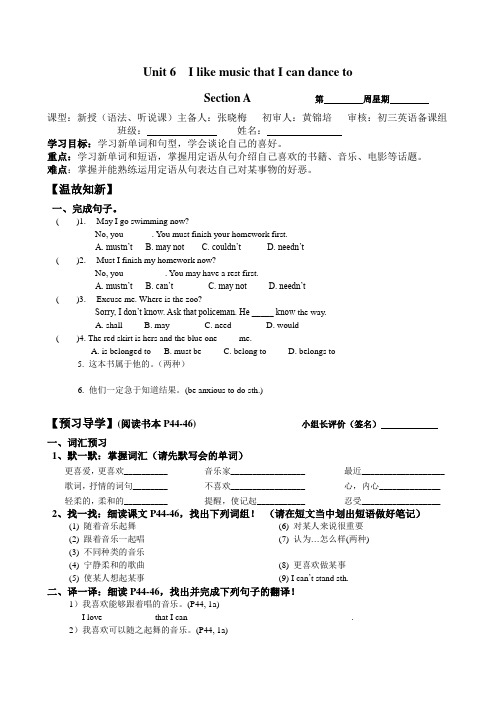
Unit 6 I like music that I can dance toSection A 第周星期课型:新授(语法、听说课)主备人:张晓梅初审人:黄锦培审核:初三英语备课组班级:姓名:学习目标:学习新单词和句型,学会谈论自己的喜好。
重点:学习新单词和短语,掌握用定语从句介绍自己喜欢的书籍、音乐、电影等话题。
难点:掌握并能熟练运用定语从句表达自己对某事物的好恶。
【温故知新】一、完成句子。
( )1. ---May I go swimming now?---No, you ______. You must finish your homework first.A. mustn’tB. may notC. couldn’tD. needn’t( )2.--- Must I finish my homework now?---No, you _________. You may have a rest first.A. mustn’tB. can’tC. may notD. needn’t( )3. ---Excuse me. Where is the zoo?---Sorry, I don’t know. Ask that policeman. He _____ know the way.A. shallB. mayC. needD. would( )4. The red skirt is hers and the blue one ____ me.A. is belonged toB. must beC. belong toD. belongs to5. 这本书属于他的。
(两种)___________________________________________________________________________________6. 他们一定急于知道结果。
(be anxious to do sth.)__________________________________________________________________【预习导学】(阅读书本P44-46) 小组长评价(签名)一、词汇预习1、默一默:掌握词汇(请先默写会的单词)更喜爱,更喜欢__________ 歌词,抒情的词句________ 轻柔的,柔和的__________ 音乐家_________________不喜欢_________________提醒,使记起___________最近___________________心,内心______________忍受__________________2、找一找:细读课文P44-46,找出下列词组!(请在短文当中划出短语做好笔记)(1) 随着音乐起舞_______________________(2) 跟着音乐一起唱_____________________(3) 不同种类的音乐_____________________(4) 宁静柔和的歌曲_____________________(5) 使某人想起某事_____________________ (6) 对某人来说很重要___________________(7) 认为…怎么样(两种)___________________________________________________(8) 更喜欢做某事_______________________(9) I can’t stand sth.______________________二、译一译:细读P44-46,找出并完成下列句子的翻译!1)我喜欢能够跟着唱的音乐。
九年级英语unit_6_I_like_music_that_I_can_dance_to_语法知识点
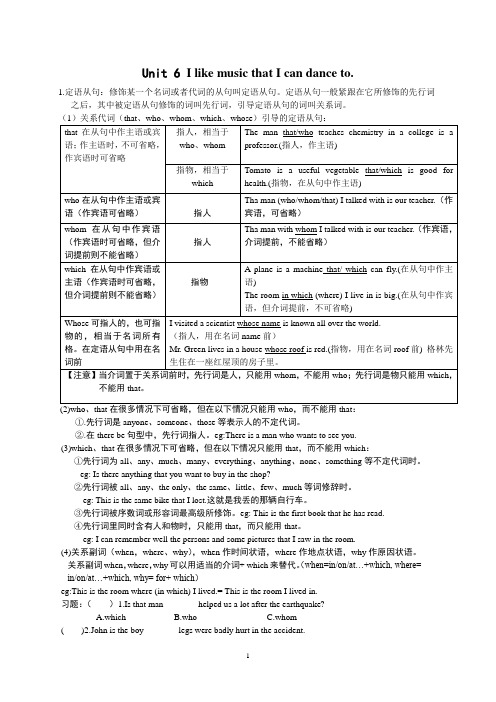
Unit 6 I like music that I can dance to.1.定语从句:修饰某一个名词或者代词的从句叫定语从句。
定语从句一般紧跟在它所修饰的先行词之后,其中被定语从句修饰的词叫先行词,引导定语从句的词叫关系词。
(2)who、that在很多情况下可省略,但在以下情况只能用who,而不能用that:①.先行词是anyone、someone、those等表示人的不定代词。
②.在there be句型中,先行词指人。
eg:There is a man who wants to see you.(3)which、that在很多情况下可省略,但在以下情况只能用that,而不能用which:①先行词为all、any、much、many、everything、anything、none、something等不定代词时。
eg: Is there anything that you want to buy in the shop?②先行词被all、any、the only、the same、little、few、much等词修辞时。
eg: This is the same bike that I lost.这就是我丢的那辆自行车。
③先行词被序数词或形容词最高级所修饰。
eg: This is the first book that he has read.④先行词里同时含有人和物时,只能用that,而只能用that。
eg: I can remember well the persons and some pictures that I saw in the room.(4)关系副词(when,where、why),when作时间状语,where作地点状语,why作原因状语。
(when=in/on/at…+which, where= 关系副词when,where,why可以用适当的介词+ which来替代。
初中英语 (定语从句)教案

定语从句引入课Step 1 :复习一个概念,引入新概念1.什么叫定语? an interesting bookA girl called Lily2. 什么叫定语从句?Step 2 :由两个例子引入两个关系代词which and who,并且强调两个概念:先行词、关系代词。
1、站在那里的人是我的叔叔。
The man is my uncle . The man is standing there .The man who is standing there is my uncle.2、放在桌子上的那本书是我的。
The book is mine . The book is on the desk .The book which is on the desk is mine .Step 3 : 操练which 和who 的用法,要求学生圈出先行词。
1. I met a woman ___________can speak six languages .2. Wher e’s the picture ________used to be on this wall.3. She asks questions _______are not easy to answer.4. Everybody ________ went to the party enjoyed it .5. Have you seen the money _______ was on the table .6. I don’t know anybody _______ wants to buy a car .Step 4 : 预计难点操练――学生在自己合并句子时,会搞不清定语从句的位置。
1. What’s the matter with the boy ? The boy is coughing all the time .2. That is the nurse . The nurse took his temperature .3. She went to the hospital . The hospital opened last year .4. The doctor was very busy . The doctor saw me just now .5. The woman felt very sorry for him . She was helping the man to walk .6. Have you caught the cat ? The cat ran past the man .通过学生操练,发现以下问题:1. What’s the matter wit合并句子后,从句符号没有跟着主句变。
人教版英语九年级全册Unit6SectionA知识点学案

本次课教案:【温故知新】1. 因……而出名___________________________2. 避免做某事_____________________________3. 根据___________________________4. 自然环境的___________________________5. 国际的___________________________6. no matter ___________________________7. everyday ___________________________8. chopstick ___________________________考点一:I think the TV was invented before the car. 我认为电视是在汽车之前被发明的。
(P41)【考点梳理】此从句是一般过去时的被动语态。
一般过去时的被动语态的基本结构为:_________________________________I think the computer was invented after the car.【小试牛刀】()—Simon,do you know who invented the kite?—Sure! It _________ by Mozi over 2,000 years ago.A. is inventedB. inventedC. was inventedD. will be invented考点二:What are they used for? 它们是用来做什么的?(P42)【考点梳理】be used for的用法be used for 意为“被用来做……”,介词for后跟名词、代词或动名词做宾语,强调用途。
The sweaters are used for keep ing us warm in winter.The cloth is used for mak ing clothes.【小试牛刀】()—I hear your grandpa has an old cup in your home.—Yes. It ______ drinking tea long ago and my grandpa ______ drink tea with it when he was young.A.was used to; was used toed for; used toC.was used for; was used toD.was used for; used to考点三:With pleasure! 我很乐意!(P42)【考点梳理】With pleasure!的用法“with pleasure!”意为“乐意效劳!很愿意!”。
英语(新目标)九年级 Unit 6 I like music that I can dance to 初中定语从句

先行词与关系词(一般原则 一般原则) 一般原则
1、先行词是人的时候,多用关系词who, that, 人 有时候用whose, whom. 例: A person who/that steals things is called a thief. who/that I talked with is our teacher. The man 2、先行词是物的时候,关系词多用which, that, 物 有时候用 when ,where, why. that/whichwere planted last These are the trees year. that/which can fly. A plane is a machine
初中定语从句
1.This is the doctor who came from London. 2. The book which I am reading is written by Tomas Hardy. 3.The man who(m) you are talking to is my good friend. 4. This is the room that Shakespeare was born in. 5.He has a friend whose father is a doctor. 6.The classroom whose door is broken will soon be repaired. 7. Do you like the book whose color is yellow? 8. Do you remember the day when you joined our club? 9. The school in which he once studied is very famous. 10. This is the house where I lived two years ago. 11. Please pass me the book whose (of which) cover is green. 12. The man who lives next to us is a policeman. 13.You must do everything that I do. 14. Shanghai is the city where I was born. 15. This is the best film that I have seen. 16. The first place that they visited in London was the Big Ben.
定语从句-人和物unit6

1.Chen zijiang is a paper-cutting expert __________ I whom interviewed for my article on Chinese Art. 先行词是表示人的名词时,在从句中作宾语,用whom, who, that, 引导定语从句,在从句中作宾语的关系词可省 略 who 2. A young farmer _________ wanted a wife would look at a young woman’s paper –cutting skills before marrying her. 先行词是表示人的名词时,在从句中作主语,用 who, that, 引导定语从句 3.People to ________ whom the dead person was related would make these things on special days and during festivals. 当关系代词前有介词时,用“介词+ whom‖,先行词是表 示物的名词时用“介词+ which‖
• C. his real name D. whose real name
―whose +名词中心词”这一结构在定语从句中既能作主语 (如题5),又能作宾语(如题4)。whose 的先行词常用来 指人(如题5),但有时也可以用来指具体事物或抽象概念 (如题4),这时可以与of which 结构互换,词序是:“名词 +of which‖ 。题1可变为:from the effects of which …
6 The man pulled out a gold watch, __________ were made of small diamonds. (2008陕西卷) A. the hands of whom B. whom the hands of C. which the hands of D. the hands of which 解析:“表的指针”是用钻石造的。这里涉及到了所有关系。 在定语从句中,对于事物的所有关系我们可以使用whose + 名词,the + 名词 + of which 或of which the + 名词这三 种形式。D项符合 the + 名词 + of which 结构,所以是正确 的。 7 The growing speed of a plant is influenced by a number of factors, _______ are beyond our control. (2008湖南卷) A. most of them B. most of which C. most of what D. most of that 解析:factors为先行词,且为非限制性定语从句,所以答案应 该选most of which。
英语语法定语从句教案

英语语法定语从句教案【篇一:初中英语语法中考总复习教案—定语从句】 hanbo culture training center test paper for grade 9初中英语语法中考总复习教案—定语从句先行词定语从句一.定义:在复合句中,用来修饰某一名词或代词的从句叫做定语从句。
被定语从句修饰的名词、代词叫先行词。
定语从句放在先行词之后。
i like 先行词(物)↘引导词she is a 先行词(人)↘引导词二.引导词:关系代词:that , which, who, whom, whose关系副词:where, why, when关系代词关系副词①② a. tellb. is telling c. tells先行词总结:㈠从句谓语动词的单复数与_____________的单复数一致,(当引导词充当定语从句的主语时)③ it is the thing ______ i like.a. that b. when c. why④ she is a girl ______ studies well. a. whomb. wherec. which ㈡判断找引导词是关系代词或关系副词,找出定语从句的主谓宾,看缺什么成分。
⑤ i like the music _______ he writes.a. /b. whoc. why㈢that 引导定语从句,充当定语从句的宾语时,可以省略。
三.that与which的区别:that和which一般可互换,但下列情况只用that1. i’m sure she has something ______ you can borrow.a. thatb. which⑴先行词为:all, everything, nothing, something, anything, little, much, few等不定代词时2. i’ve read ⑵先行词被all, every, no, some, any, little, much等修饰时⑶先行词被序数词和最高级修饰时4. this is the only book that belongs to him.⑷先行词被the only, the very, the same, the best, the last等修饰时⑸先行词既有人也有物6. who is the girl ______ spoke to you just now?which is the car ______ was made in china?a. thatb. whoc. which⑹当主句以who或which开头时,定语从句的引导词用that,不用who或which,避免重复3 that不能用于介词后及表示所有的,和非限制性定语从句四.其它的:⑴ who is the man ______ i saw yesterday.who与that都可指人,但前面有who,后面只可用that⑵ this is the house in ______ he lives.a. thatb. whichc. who先行词是物,且介词提前用whichthe school (______ my father works) looks very beautiful.(my father works in the school)a. whichb. in thatc. in which⑶ is this the man with ______ you went to the zoo yesterday?a. whob. whomc. whichhe is a man ( _______ we can learn).a. whomb. from whichc. from whom先行词是人,且介词提前用whom⑷ he lives in a house, _______ has many trees around it.a. thatb. whichc. who先行词(物)与引导词之间有逗号隔开(非限制性定语从句),用which⑸名词a. whichb. whosec. that引导词后面有名词时,引导词用whose⑹ he is a boy(______ is confident.)主语(介词提前)he is the teacher ( ______ you are waiting for.)a. whob. whomc. whose 宾语先行词是人:①引导词在句中作主语,引导词用who②介词提前在句中作宾语,引导词只能用whom③引导词在从句中作宾语,引导词用who/whom⑺this is the factory ________ my father works in.this is the factory in ________ my father works.this is the factory ________ my father works.先行词表示地点时,引导词用where,在句中作状语,where不能作主语。
初中英语定语从句教案

初中英语定语从句教案第一章:定语从句简介1.1 定语从句的定义解释定语从句是英语中的一种从句,用来修饰名词或代词。
强调定语从句在句子中的作用和重要性。
1.2 定语从句的类型介绍限定性定语从句和非限定性定语从句的区别。
举例说明两种类型的定语从句及它们在句子中的使用。
第二章:关系代词2.1 关系代词who解释关系代词who用于指代人,并在定语从句中作主语。
给出例子,让学生理解并掌握who的使用。
2.2 关系代词whom解释关系代词whom用于指代人,并在定语从句中作宾语。
给出例子,让学生理解并掌握whom的使用。
第三章:关系副词3.1 关系副词where解释关系副词where用于指代地点,并在定语从句中作地点状语。
给出例子,让学生理解并掌握where的使用。
3.2 关系副词when解释关系副词when用于指代时间,并在定语从句中作时间状语。
给出例子,让学生理解并掌握when的使用。
第四章:关系代词和关系副词的综合应用4.1 关系代词和关系副词的混合使用解释在某些情况下,定语从句中既可以有人称代词作主语或宾语,又有地点或时间状语。
给出例子,让学生理解并掌握关系代词和关系副词的综合应用。
4.2 练习题提供一些练习题,让学生通过填空、改写等形式的练习,巩固关系代词和关系副词的综合应用。
第五章:定语从句的先行词5.1 先行词的定义和作用解释先行词是在定语从句前面出现的名词或代词,它在定语从句中作为某个成分出现。
强调先行词在定语从句中的重要性。
5.2 先行词的识别和运用给出例子,让学生学会识别先行词,并理解其在定语从句中的作用。
提供一些练习题,让学生通过实际操作,进一步巩固先行词的识别和运用。
第六章:定语从句中的介词6.1 介词与定语从句的关系解释在定语从句中,介词与名词或代词一起使用,表示时间、地点、原因等。
强调介词在定语从句中的作用。
6.2 常见介词在定语从句中的使用介绍一些常见的介词如in, on, at, above, below等,并给出例子,让学生理解并掌握其使用。
unit 6第一课时定语从句

• 1.--Do you know the man___ is talking with your father? • ---Yes, he 's our headmaster. • A he B who C which D whom
• 4. Can you lend me the dictionary ___ the other day? • A that you bought B you bought it • C that you bought it D which you bought it
• • • • • • •
who (修饰人) that(既可修饰人也可修饰物) which(仅修饰物) when(表时间) where(表地点) why(表原因) 关系代词在从句中可充当主语,宾语或定 语 • 关系副词在从句中充当状语
1.在定语从句中修饰人作主语用 who /that
• 1. The boys who/that are playing football are from class one. • 2. Yesterday I helped an old man who/that lost his way . 3. The girl who/that often helps me with my English is from England. 4. The people that/ who come to visit t句中修饰物作宾语用 which /that /不填
• 1.This is the pen which/that/不填 he bought yesterday. • 2. The film which/that/不填 we saw last night was wonderful. • 3. This is the card which/that/不填 I've just received. • 4. The letter that/which/不填 I received yesterday was from my father.
初中英语 九年级定语从句语法精讲
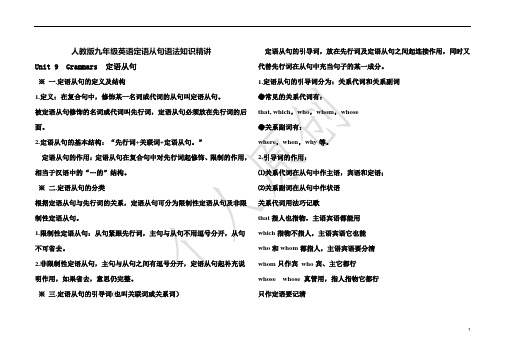
人教版九年级英语定语从句语法知识精讲Unit 9 Grammars 定语从句※一.定语从句的定义及结构1.定义:在复合句中,修饰某一名词或代词的从句叫定语从句。
被定语从句修饰的名词或代词叫先行词,定语从句必须放在先行词的后面。
2.定语从句的基本结构:“先行词+关联词+定语从句。
”定语从句的作用:定语从句在复合句中对先行词起修饰、限制的作用,相当于汉语中的“…的”结构。
※二.定语从句的分类根据定语从句与先行词的关系,定语从句可分为限制性定语从句及非限制性定语从句。
1.限制性定语从句:从句紧跟先行词,主句与从句不用逗号分开,从句不可省去。
2.非限制性定语从句,主句与从句之间有逗号分开,定语从句起补充说明作用,如果省去,意思仍完整。
※三.定语从句的引导词(也叫关联词或关系词)定语从句的引导词,放在先行词及定语从句之间起连接作用,同时又代替先行词在从句中充当句子的某一成分。
1.定语从句的引导词分为:关系代词和关系副词●常见的关系代词有:that, which,who,whom,whose●关系副词有:where,when,why等。
2.引导词的作用:⑴关系代词在从句中作主语,宾语和定语;⑵关系副词在从句中作状语关系代词用法巧记歌that指人也指物,主语宾语都能用which指物不指人,主语宾语它也能who和whom都指人,主语宾语要分清whom只作宾who宾、主它都行whose whose 真管用,指人指物它都行只作定语要记清关系代词和关系副词的用法见下表:①Mary likes music (that is quiet and gentle).玛丽喜欢轻柔的音乐。
(that 作主语)②The coat is blue.我放在桌子上的那件 用于指物,在句中作主语或宾语,作主语不可省略,作宾语可位于我们昨天晚上看 用作主语,whom 作宾语。
在口语中,。
例如:经常在Li Ming is talking to ?正在与李明谈话的老师是谁?(作宾语)㈡关系副词的用法1. whenwhen指时间,其先行词表示时间,在句中作时间状语。
Unit 6定语从句 -袁黎
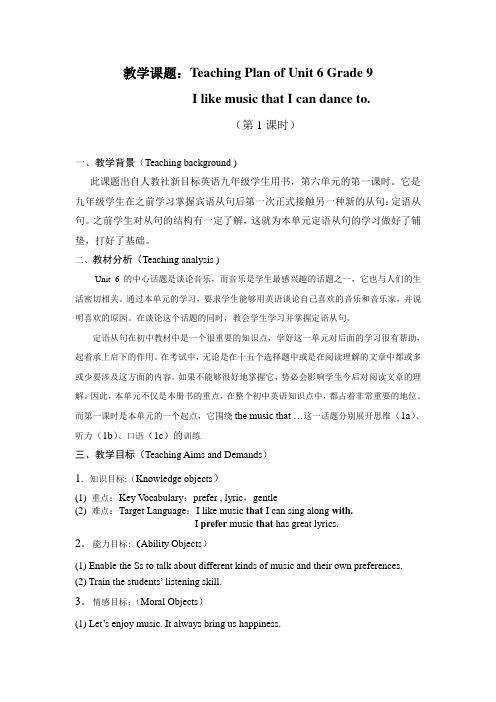
教学课题:Teaching Plan of Unit 6 Grade 9I like music that I can dance to.(第1课时)一、教学背景(Teaching background )此课题出自人教社新目标英语九年级学生用书,第六单元的第一课时。
它是九年级学生在之前学习掌握宾语从句后第一次正式接触另一种新的从句:定语从句。
之前学生对从句的结构有一定了解,这就为本单元定语从句的学习做好了铺垫,打好了基础。
二、教材分析(Teaching analysis )Unit 6的中心话题是谈论音乐,而音乐是学生最感兴趣的话题之一,它也与人们的生活密切相关。
通过本单元的学习,要求学生能够用英语谈论自己喜欢的音乐和音乐家,并说明喜欢的原因。
在谈论这个话题的同时,教会学生学习并掌握定语从句。
定语从句在初中教材中是一个很重要的知识点,学好这一单元对后面的学习很有帮助,起着承上启下的作用。
在考试中,无论是在十五个选择题中或是在阅读理解的文章中都或多或少要涉及这方面的内容。
如果不能够很好地掌握它,势必会影响学生今后对阅读文章的理解。
因此,本单元不仅是本册书的重点,在整个初中英语知识点中,都占着非常重要的地位。
而第一课时是本单元的一个起点,它围绕the music that …这一话题分别展开思维(1a)、听力(1b)、口语(1c)的训练三、教学目标(Teaching Aims and Demands)1. 知识目标:(Knowledge objects)(1) 重点:Key V ocabulary:prefer , lyric,gentle(2) 难点:Target Language:I like music that I can sing along with.I prefer music that has great lyrics.2.能力目标:(Ability Objects)(1) Enable the Ss to talk about different kinds of music and their own preferences.(2) Train the students’ listening skill.3.情感目标:(Moral Objects)(1) Let’s enjoy music. It always bring us happiness.(2) Enable the Ss to enjoy kinds of music.四、教学过程(Teaching Procedures)(一)准备阶段Before teaching, the teacher should get ready for the text and the PPT, the students should search their favorite music and singers , and they must think of the reasons.【设计说明:教师要准备的工作是备好教案,制好课件。
初中英语语法中考总复习教案—定语从句

HanboCultureTrainingCenterTestPaperforGrade9初中英语语法中考总复习教案—定语从句IlikethemusicthatIcansingalongwith.先行词定语从句一.定义:在复合句中,用来修饰某一名词或代词的从句叫做定语从句。
被定语从句修饰的名词、代词叫先行词。
定语从句放在先行词之后。
IlikemusicthatIcandanceto.二.①②总结:㈠从句谓语动词的单复数与_____________的单复数一致,(当引导词充当定语从句的主语时)③Itisthething______Ilike.A.thatB.whenC.why④Sheisagirl______studieswell.A.whomB.whereC.which㈡判断找引导词是关系代词或关系副词,找出定语从句的主谓宾,看缺什么成分。
⑤Ilikethemusic_______hewrites.A./B.whoC.why㈢that引导定语从句,充当定语从句的宾语时,可以省略。
三.That与which的区别:that和which一般可互换,但下列情况只用that1.I’msureshehassomething______youcanborrow.A.thatB.which⑴先行词为:all,everything,nothing,something,anything,little,much,few等不定代词时2.I’veread allthebooksthatarenotmine.⑵先行词被all,every,no,some,any,little,much等修饰时3.Thisisthefirstbookthathewasread.⑶⑷⑸⑹3⑴who与⑵⑶Isthisthemanwith______youwenttothezooyesterday?A.whoB.whomC.whichHeisaman(_______wecanlearn).A.whomB.fromwhichC.fromwhom先行词是人,且介词提前用whom⑷Helivesinahouse,_______hasmanytreesaroundit.A.thatB.whichC.who先行词(物)与引导词之间有逗号隔开(非限制性定语从句),用which⑸Iknowtheboy_______bikeisred.名词Helovestheroom_______windowistowardstheeast.Doyouknowthegirl_______hairislong.A.whichB.whoseC.that引导词后面有名词时,引导词用whose⑹Heisaboy(______isconfident.)(Theboyisconfident.)主语(②③⑺(8(9中作时间状语,则用关系副词when。
英语人教版九年级全册定语从句教学设计

学习目标:1.通过总结归纳,习题训练等形式巩固定语从句用法。
2.通过纠错,例文欣赏等形式学会如何写调查报告来描述人们最喜欢的音乐。
学习重点:1.通过总结归纳,习题训练等形式巩固定语从句用法。
2.通过纠错,例文欣赏等形式学会如何写调查报告来描述人们最喜欢的音乐。
学习难点:通过纠错,例文欣赏等形式学会如何写调查报告来描述人们最喜欢的音乐。
教学设计Step1.Free Talk.( Topic : Invention: Mobile phone )(要求:发言一人次奖3分。
语言丰富,声音洪亮者再加奖3分)(4’)Step2.Review:定语从句用法(5’)(1):提问定语从句的句型结构及用法(2):让学生一人说一个含有定语从句的句子。
(3):总结归纳定语从句用法概念:修饰某一名词或代词的句子叫定语从句;被修饰的词叫先行词;先行词和定语从句之间的是关系代词。
关系代词在定语从句中所做的句子成分that 指人或物做主语或宾语which 指物做主语或宾语who 指人做主语或宾语whom 指人做宾语注意:(1)关系代词在定语从句中做的有一定的句子成份,若做宾语时关系词可以省略。
Eg: I lost the book( that) my father bought (2)当关系词在定语从句中做主语时,定语从句的谓语动词要与先行词的人称和数保持一致。
Eg: She loves music which is quiet and beautifulStep3练一练(要求:做完后小组内统一答案,4发言,有错误的其他学生补充,组长组织)(5’)tep4.语法拓展:(6’)定语从句中关系代词只用that ,不用which 的情况(1)先行词前被序数词或形容词最高级修饰时只能用that Eg: This is the first book that he wrote.(2)当先行词同时包含人和物时只能用thatEg: The boy and his bag that I saw was by the window.当先行词是everything, something 等不定代词时只能用thatStep5.火眼金睛:找出下列文章中的错误并纠正。
初中英语语法 定语从句 专题讲解 (含教案及练习题)
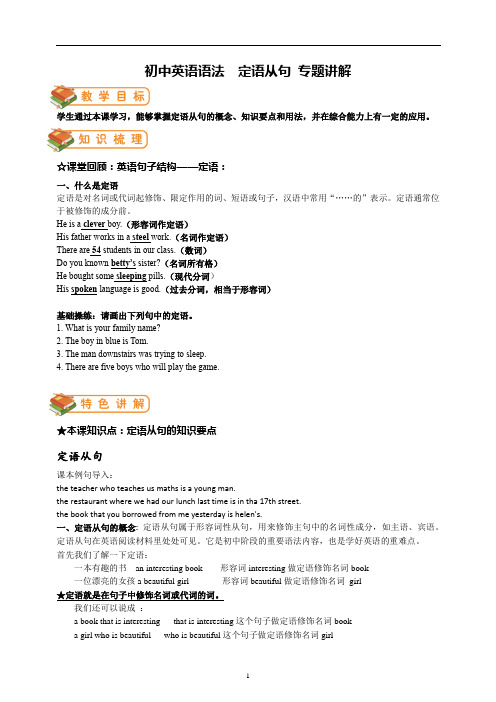
初中英语语法定语从句专题讲解学生通过本课学习,能够掌握定语从句的概念、知识要点和用法,并在综合能力上有一定的应用。
☆课堂回顾:英语句子结构——定语:一、什么是定语定语是对名词或代词起修饰、限定作用的词、短语或句子,汉语中常用“……的”表示。
定语通常位于被修饰的成分前。
He is a clever boy.(形容词作定语)His father works in a steel work.(名词作定语)There are 54 students in our class.(数词)Do you known betty’s sister?(名词所有格)He bought some sleeping pills.(现代分词)His spoken language is good.(过去分词,相当于形容词)基础操练:请画出下列句中的定语。
1. What is your family name?2. The boy in blue is Tom.3. The man downstairs was trying to sleep.4. There are five boys who will play the game.★本课知识点:定语从句的知识要点定语从句课本例句导入:the teacher who teaches us maths is a young man.the restaurant where we had our lunch last time is in tha 17th street.the book that you borrowed from me yesterday is helen's.一、定语从句的概念:定语从句属于形容词性从句,用来修饰主句中的名词性成分,如主语、宾语。
定语从句在英语阅读材料里处处可见。
它是初中阶段的重要语法内容,也是学好英语的重难点。
首先我们了解一下定语:一本有趣的书an interesting book 形容词interesting做定语修饰名词book一位漂亮的女孩a beautiful girl形容词beautiful做定语修饰名词girl★定语就是在句子中修饰名词或代词的词。
人教版九年级初中英语定语从句教案
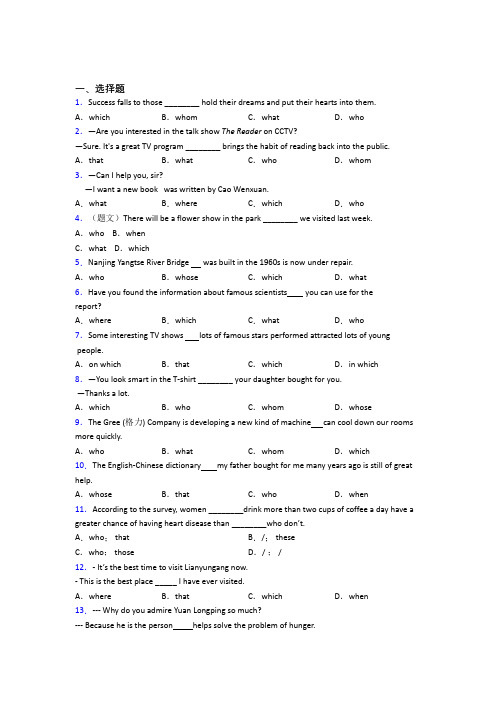
一、选择题1.Success falls to those ________ hold their dreams and put their hearts into them. A.which B.whom C.what D.who2.—Are you interested in the talk show The Reader on CCTV?—Sure. It's a great TV program ________ brings the habit of reading back into the public. A.that B.what C.who D.whom 3.—Can I help you, sir?—I want a new book was written by Cao Wenxuan.A.what B.where C.which D.who4.(题文)There will be a flower show in the park ________ we visited last week.A.who B.whenC.what D.which5.Nanjing Yangtse River Bridge was built in the 1960s is now under repair.A.who B.whose C.which D.what6.Have you found the information about famous scientists you can use for thereport?A.where B.which C.what D.who7.Some interesting TV shows lots of famous stars performed attracted lots of youngpeople.A.on which B.that C.which D.in which 8.—You look smart in the T-shirt ________ your daughter bought for you.—Thanks a lot.A.which B.who C.whom D.whose9.The Gree (格力) Company is developing a new kind of machine can cool down our rooms more quickly.A.who B.what C.whom D.which10.The English-Chinese dictionary my father bought for me many years ago is still of great help.A.whose B.that C.who D.when 11.According to the survey, women ________drink more than two cups of coffee a day have a greater chance of having heart disease than ________who don’t.A.who; that B./; theseC.who; those D./ ; /12.- It’s the best time to visit Lianyungang now.- This is the best place _____ I have ever visited.A.where B.that C.which D.when13.--- Why do you admire Yuan Longping so much?--- Because he is the person helps solve the problem of hunger.A.which B.who C.what D./14.That was his first invention. It was a machine ________ clothes.A.that used to wash B.which was used to washingC.which got used to washing D.that was used to wash15.—What impressed you most in your middle school?— _______________. They were strict but always encouraged me when necessary.A.The teachers who helped me a lot B.The activities which I took part inC.The subjects which I was interested in D.The books that I shared with my friends 16.﹣﹣﹣Where would you like to visit the next winter holiday?﹣﹣﹣I want to visit a place ______ is famous for its views.A.which B.where C.when D.who17.Though the doctor advised Alice strongly that she should take a good rest, ______didn’t help. A.she B.it C.which D.he18.---The panda is a kind of animal _______ I like best.A.who B.which C.where D.what19.There are many works of art in the museum _______we will visit tomorrow.A.where B.who C.which D.what20.I like fruit ________ tastes sweet.A.who B.what C.which D.when 21.—Shakespeare is a great writer ________ is considered as a genius (天才).—I think so. Many people around the world admire him very much.A.which B.who C.whose D.what22.Lei Feng is a great man ________ is known by people all over the world.A.what B.which C.who D.when23.Great changes have taken place in our city in the past ten years. Everything ________ comes into sight is so new to me.A.that B.which C.who D.whom24.—I only heard of him a little. But what are the other important things ________ done by him?—He also set up Tongmenghui with Huang Xing.A.that B.which C.who D.which were25.__________ wants to go to the park this weekend, raise your hands, please. A.Anyone who B.Those who C.Anyone D.Who26.一What are you reading these days, Eric?一The Little Prince, the best read ________teaches me a lot.A.which B.what C.who D./27.—What kind of music do you like?—I like music ________ I can sing along with.A.who B.where C.that D.when28.—How was your trip to Yangzhou?—Wonderful. I think I have just visited the best place ________ can show us the beauty of Spring. A.what B.who C.that D./29.I will never forget the important people in my life ________ helped and supported me. A.who B.which C.what D.whom30.— According to the survey, women ________ drink more than two cups of coffee a day have a great chance of having heart disease than ________ wh o don’t.— Oh, really? How great he is!A.who, that B./, these C.who, those D./, /31.Do you know the boy ________ mother is an excellent teacher?A.which B.who C.whose D.what32.—Do you know the man ________is under the tree? —Oh, he is our new P.E. teacher. A.who B.whose C.whom D.which33.The boy__________ parents died two years ago lives with his grandpa now.A.whose B.who C.that D./34.The boy ______ always thinks of others is popular with his classmates.A.who B.what C.where D.which35.I'd like to tell you something about the traffic rules ________you will find useful when traveling to England.A.what B.which C.who D.how36.This is a heartwarming story about a boy _________ saved his mother’s life.A.which B.what C.where D.who37.--- Have you ever seen the film The Shawshank Redemption?---Yes, and I think it is the best film teaches me a lot.A.that B.which C.what D./38.—What does "mother" mean to you, Sandy?—Everything. Mother is the person ________ is always standing in the wind waiting for me on cold winter days.A.which B.who C.whom D.what39.Home is a place ________ you grow up hoping to leave, and grow old hoping to return to. A.who B.what C.that D.how 40.Wetchat is a useful communication tool________can help people talk to friends, share photos, ideals and feelings freely.A.whom B.which C.who D.whose41.---Is this park ________ you’ve visited recently?---Yes, it’s one of the most beautiful parks I’ve ever visited.A.that B.what C.the one D.where42.—It’s the best time to visit Lianyungang now.—Yes, it is the beautiful city ________ I want to visit.A.where B.who C.which D.when43.---At present young people prefer WeChat to keep in touch with their friends.--Yes. It seems to be the best way of communication people like.A.that B.how C.who D.what44.I will never forget the three years I spent with my classmates and teachers in the middle school.A.which B.when C.what D.where45.– Do you like the weekly talk show The Readers on CCTV?–Sure. It’s a great TV program can develop the habit of reading.A.who B.that C.what D.whose46.--- Do you know what Robinson Crusoe did just after he got to the island?--- Yes. The first thing ________ he did was to look for some food.A.who B.that C.which D.what47.The most important thing _____ we should do is to be honest.A.which B.who C.that D.what48.In 2019, the actor Guo Jingfei acted in a TV play All is Well _____ attracted thousands of his fans.A.whose B.what C.which D./49.— Who is the man________ is interested in reading Beautiful Yangzhou?—It’s Mr. Baker, our English teacher.A.that B./ C.whom D.which50.This is the best book________I have read.A.\ B.whose C.which D.who【参考答案】***试卷处理标记,请不要删除一、选择题1.D【详解】句意:成功属于那些坚守他们的梦想,并全身心投入其中的那些人。
- 1、下载文档前请自行甄别文档内容的完整性,平台不提供额外的编辑、内容补充、找答案等附加服务。
- 2、"仅部分预览"的文档,不可在线预览部分如存在完整性等问题,可反馈申请退款(可完整预览的文档不适用该条件!)。
- 3、如文档侵犯您的权益,请联系客服反馈,我们会尽快为您处理(人工客服工作时间:9:00-18:30)。
Unit 6 I like music that I can dance to.
在本单元内我们要完成以下学习任务:
1.学习谈论自己的喜好。
2.学习表达自己对某事的好恶。
3.学习用that和who引导的定语从句。
4.学习几个重要的单词和词组:prefer, remind of, interest, suggest
一、重难点提示
1.—What kind of music do you like?你喜欢什么样的音乐?
—I like music that I can dance to.我喜欢可以跟着一起跳舞的音乐。
I like music that I can dance to.是一个由that引导的定语从句,用来修饰music.
定语从句是本单元的重点,也是一个难点。
由一个句子来充当定语,叫定语从句。
定语从句用来修饰一个名词或代词。
被定语从句所修饰的那个词叫先行词。
引导定语从句的有关系代词和关系副词两种。
在本单元中只要求同学们掌握关系代词who和that引导的定语从句。
(1)由who引导的定语从句。
当先行词指人时,定语从句通常由who引导。
who引导定语从句,在从句中作主语。
e.g. Carman likes musicians who play different kinds of music.
Carman喜欢演奏不同种类音乐的音乐家。
I like musicians who write their own songs. 我喜欢自己写歌的音乐家。
I love singers who write their own music. 我喜欢自己写歌的歌手。
※定语从句中谓语动词的数取决于先行词。
e.g. This is the boy who has won the first prize in the game.这就是那个在比赛中得第一名的男孩。
The students who are going to the cinema have got their tickets.那些去电影院的学生们已拿到了票。
※当先行词指人时,也可以用that。
e.g. The girl that (who) is speaking is Jim’s sister. 那个正在讲话的女孩是Jim的姐姐。
※当引导先行词的关系代词在从句中作宾语时,可用whom.
e.g. Do you know the girl whom your teacher is talking to?
你认识那个你们老师正在与她交谈的女孩吗?
※当引导先行词的关系代词在从句中作宾语时也可以用that, 还可以省略:
e.g. The boy (whom/that) you’re looking for is on the playground.你正在找的那个男孩在操场上。
(2)由that引导的定语从句:
that 引导定语从句时先行词可以指人也可指物,that在从句中可作主语,也可作宾语。
作宾语时可以被省略。
e.g. Carman likes music that is loud.(指物,在从句中作主语,不能省略。
)
I prefer groups that play quiet and gentle songs(指人,作主语,不能省略)
This is the person that you are looking for.(指人,作宾语,可以省略,可用whom代换)
The moment you speak, you are placed. 1
2.prefer vt. =like better 喜欢……(甚于喜欢……);宁选……(而不选……)
(1)prefer A to B
e.g. I prefer English to maths.我比较喜欢英语而不喜欢数学。
(2)prefer doing A to doing B
e.g. He prefer staying at home to playing soccer. 他宁可呆在家里也不愿去踢球。
(3)prefer to do A rather than do B
e.g. We prefer to watch TV at home rather than go to the cinema.我们宁可在家看电视而不愿去电影院。
She prefers to listen to light music rather than watch the boring TV play.
她宁可听轻音乐而不愿看那无聊的电视剧。
3.The music reminds me of Brazilian dance music. 这音乐使我想起了巴西的舞曲。
remind vt. 使(人)想起,使记得,提醒
(1)remind sb of sth./sb.
e.g. He reminds me of my father. 他使我想起了我父亲。
(2)remind sb that…
e.g. She reminded me that I hadn’t finished my homework.她提醒我还没完成作业。
(3)remind sb. to do sth.
e.g. Please remind me to post the letter.请提醒我发这封信。
4.It does have a few good features.它的确有一些好的特征。
does是助动词,在这个句子中起强调作用,强调句中的谓语动词,注意人称和数以及时态。
当句中有助动词时,其后的动词用原形。
e.g.—Why didn’t you tell me about it? 为什么不告诉我那件事呢?
—I did tell you, but you have forgotten.我的确告诉你了,但你忘记了。
I did see him yesterday.我昨天的确看见他了。
5.I see the same things every day and they don’t interest me as much.
我每天都看到与此相同的东西,它们不能引起我的兴趣。
interest v. 使……感兴趣(make …interested in …)
e.g. The news about Shenzhou VI interests all of us.有关神舟6号的新闻使我们每个人都感兴趣。
Nothing can interest him.没什么能让他感兴趣的。
6.Whatever you do, don’t miss this exhibition. 无论你做什么都不能错过这次展出。
whatever相当于no matter what, 引导的是一个让步状语从句。
e.g. Whatever you say, I won’t believe you.=No matter what you say, I won’t believe you.
无论你说什么,我都不会相信。
Whatever happens, you must keep calm.无论发生了什么事,你都要保持镇静。
7.As the name suggests, the band has lots of energy.
suggest vt. 使人联想(某物),使想起……
e.g. Those skyscrapers suggest giant match boxes.
The moment you speak, you are placed.
2
那些摩天大楼看起来像(使人想起)巨大的火柴盒。
8.I don’t know what to try next.我不知道下次该试试什么。
what to try next是“特殊疑问词+不定式”构成的复合结构,在句中作 know的宾语。
“特殊疑问词+不定式”复合结构在句中可作主语、表语、宾语。
e.g. When to hold the meeting is not decided.什么时候开会还没决定。
(作主语)
The problem is where to find him.问题是上哪儿去找到他。
(作表语)
Can you tell me what to do next?你能告诉我下一步该做什么吗?(作宾语)
The moment you speak, you are placed. 3。
